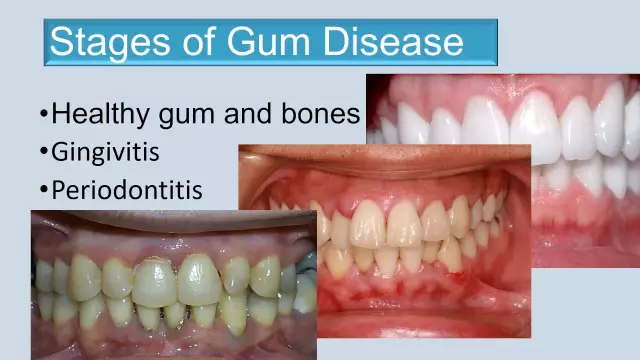- Author Curtis Blomfield [email protected].
- Public 2023-12-16 20:44.
- Last modified 2025-01-23 17:01.
Gum disease is an unpleasant topic for many. Not everyone will be able to muster up the courage and go to the doctor to find out the answer to the question of how periodontal disease is treated. To overcome fear and embarrassment, it is better to familiarize yourself in advance with what you will experience in the dentist's chair.

How is periodontal disease treated. Diagnosis
This disease is caused by bacteria that multiply in the tissues surrounding the tooth. Adults lose teeth more often due to periodontal disease than due to caries. After thirty-five years, every third suffers from this disease. Most often, plaque is to blame for its progression. But genetic predisposition also plays a significant role. There are several stages of the disease. At first, everything looks harmless - it's still gingivitis, not periodontal disease. The causes of the disease have not yet made the situation irreversible, that is, redness of the gums, slight swelling, swelling and bleeding can be a single episode.

Therefore, many do not attach importance to these symptoms. Since the pain is not so strong,then only a dentist can determine periodontal disease at this stage and make a diagnosis. And that is often only after looking at the X-ray. If you delay with treatment and diagnosis, the disease will progress. Not only the gum will be damaged in the subsequent stage of periodontal disease - the inflammation will affect the bone. If you do not take action, then the teeth will begin to loosen. In especially severe cases, they will have to be removed. But if you have been diagnosed with the initial stage, then the doctor will definitely tell you how periodontal disease is treated so that it does not come to tooth loss. The methods of treatment that are used in modern clinics are effective. They eliminate common symptoms - bleeding and suppuration of the gums, bad breath and loose teeth.
Means for the treatment of periodontal disease
Don't self-diagnose or self-medicate. The condition of the gums and teeth is greatly influenced by the state of the nervous and endocrine systems, vitamin balance. It is also important how well the gum tissues are supplied with oxygen. Often, periodontal disease is a diagnostic criterion for a decrease in general immunity. You need to ask your therapist what means you can improve it. Along the way, check the foci of inflammation in your body (for example, chronic tonsillitis).

The traditional approach to how periodontitis is treated involves cleaning the gum pockets (a rather traumatic procedure) and removing deposits that have accumulated around the tooth. Advanced techniques recommend a wide rangeantibiotics for local and internal use. Thus, Chlorhexidine is used as an additional agent for sanitizing the oral cavity and maintaining the whiteness of teeth. At home, you can use rinsing with an extract of barberry, wormwood or a decoction of Russian mustard roots. Burdock pharmacy and apple cider vinegar also help well. Gargling can only help if done regularly.






